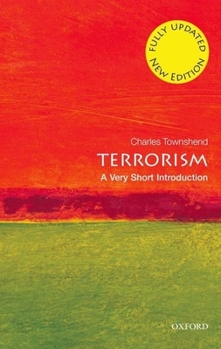Terrorism: A Very Short Introduction
(Part of the Very Short Introductions (#78) Series, Oxford's Very Short Introductions series Series, and Very Short Introductions (#78) Series)
Select Format
Select Condition 
Book Overview
This book charts a path through the outpouring of efforts to understand and explain modern terrorism, by asking what makes terrorism different from other forms of political, military action; what makes it effective; and what can be done about it. It unravels complex central questions such as whether terrorists are criminals, whether terrorism is a kind of war, what kind of threat terrorism represents, how far media publicity sustains terrorism, and...
Format:Paperback
Language:English
ISBN:0192801686
ISBN13:9780192801685
Release Date:January 2003
Publisher:Oxford University Press, USA
Length:168 Pages
Weight:0.36 lbs.
Dimensions:0.5" x 6.9" x 4.3"
Customer Reviews
1 rating
Helpful and at times insightful
Published by Thriftbooks.com User , 19 years ago
Charles Townshend has written a helpful introduction to the subject of terrorism. He begins by discussing the definition of terrorism, a task more difficult than it might seem. He indicates that terrorism is often a matter of perspective since one person's terrorist is another person's freedom fighter. There are also questions about what counts as an act of terrorism. Do intentions and goals make some acts terrorist? Can a line be drawn at the kind of victims selected for a terrorist act? Townshend looks at some laws that define terrorism, USA and British law (as I recall). Even here we encounter problems because these laws could be applied to the actions of nations themselves. In my view, state terrorism is inadequately addressed in this book; I suspect because Townshend lacks a useable sense of what it might be. Yet I think that state terrorism is the easiest category of terrorism to define as well as the most pervasive form of terrorism in the world. Townshend provides many historical examples of terrorism. They are all well chosen. He discusses the origins of terrorism in history: viz., the first terrorist groups, the philosophical patrimony of "propaganda by deed," assassination as terrorism and the terrorism during the French Revolution. He also explores different types of terrorism: revolutionary, nationalistic and religious. He ends by discussing counterterrorism as a strategy and correctly mentions the dangers inherent in such an approach. Townshend apparently believes that democracies will always be hampered in their responses to terrorism because of their high regard for human rights. Yet Townshend doesn't often discuss the many ways the "great democracies" have employed terrorism, either directly or through proxy forces, sometimes resulting in massive casualties, particularly in the third world nations. Although the western democracies might have a public relations problem in using terrorism, they certainly don't lack the aptitude. If you want to read a short introduction to the topic of terrorism, then this will do...at times quite well.





